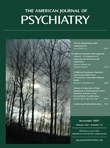Affective Disorders and Cognitive Failures: A Comparison of Seasonal and Nonseasonal Depression
Abstract
Seasonal depression shares certain common symptoms with nonseasonal depression; however, the two disorders have never been examined in a single study, to the authors’ knowledge. The goal of this research was to examine the potential similarities in cognitive impairments in seasonal affective disorder and major depressive disorder in college students in the Midwest. Identification of affective disorders was based on participants’ self-reported behavior and affect on the Beck Depression Inventory and the Seasonal Pattern Assessment Questionnaire. A group of 93 participants was assessed for major depressive disorder and seasonal affective disorder in late autumn and completed the Cognitive Failures Questionnaire for reported difficulties in everyday activities that correspond to problems with perception, attention, and memory retrieval. The results indicated that seasonal affective disorder was highly prevalent (28.0%), substantially more so than major depressive disorder (8.6%). Similar to previous research on major depressive disorder, gender differences were also evident among participants with seasonal affective disorder, with more women qualifying than men. Both affective disorders were associated with higher reports of cognitive failures in comparison to participants with no depressive symptoms. These results reveal that individuals with seasonal affective disorder showed cognitive impairments similar to those with nonseasonal depression.



